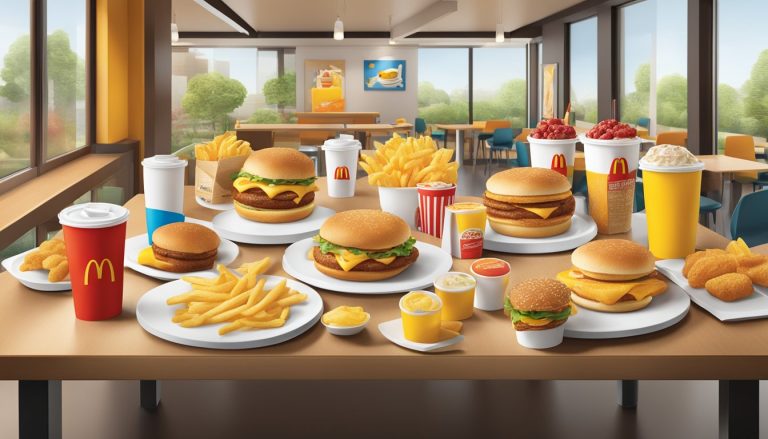McDonald’s breakfast menu has long been a favorite among fast food enthusiasts. However, numerous myths and misconceptions have circulated about the ingredients and preparation methods used for these popular morning offerings. Many people have questioned the authenticity and quality of McDonald’s breakfast items over the years.
Contrary to popular belief, McDonald’s uses real eggs in their breakfast sandwiches and prepares many items fresh in their restaurant kitchens. This article aims to address and debunk eight common myths surrounding McDonald’s breakfast menu, providing clarity on the ingredients and processes behind these iconic morning meals. By examining the facts, consumers can make more informed decisions about their breakfast choices at the Golden Arches.
1) Real Eggs Used in McMuffins

McDonald’s uses genuine, fresh eggs in their Egg McMuffin breakfast sandwiches. The round egg patties found in these popular menu items are made from USDA Grade A eggs.
These eggs are cracked and cooked on-site at McDonald’s restaurant locations. The process involves using a metal ring on the grill to shape the egg into a perfect circle that fits the English muffin.
Unlike some other fast food chains, McDonald’s does not use frozen or powdered eggs for their McMuffins. The eggs are cooked fresh daily, ensuring quality and taste.
While other McDonald’s breakfast items may use liquid eggs with additional ingredients, the Egg McMuffin stands out for its use of whole, freshly cracked eggs. This commitment to using real eggs has been a part of McDonald’s breakfast offerings since the introduction of the Egg McMuffin in 1972.
Customers can be confident they’re getting a genuine egg product when ordering an Egg McMuffin. The use of real eggs contributes to the sandwich’s popularity and enduring appeal on the McDonald’s breakfast menu.
2) Pancakes Made from Scratch
Many McDonald’s customers wonder if the restaurant’s pancakes are made from scratch. The truth is, McDonald’s pancakes are not prepared from raw ingredients in each restaurant.
Instead, the pancakes are made from a pre-mixed batter that is supplied to McDonald’s locations. This batter contains carefully measured ingredients to ensure consistency across all restaurants.
The pancakes are cooked fresh on griddles in McDonald’s kitchens. While not made entirely from scratch on-site, this method allows for efficient preparation and maintains quality standards.
Each McDonald’s pancake contains approximately 250 calories. The ingredients typically include flour, milk, eggs, and other common pancake components.
Making pancakes from scratch can be challenging and time-consuming. McDonald’s streamlined process allows them to serve a large number of customers quickly while maintaining a consistent product.
3) Breakfast All Day Misunderstanding

Many McDonald’s customers believe the chain still offers all-day breakfast. This is a common misconception. McDonald’s introduced all-day breakfast in 2016, allowing patrons to enjoy breakfast items beyond traditional morning hours.
However, the company discontinued this service in March 2020. The decision was made to simplify operations and improve service speed. Contrary to popular belief, this change was not solely due to the COVID-19 pandemic.
Former McDonald’s chef Mike Haracz revealed that plans to end all-day breakfast were in motion before the pandemic. The company found that serving breakfast items throughout the day complicated kitchen operations and slowed down service.
Currently, McDonald’s breakfast hours typically end around 10:30 or 11:00 AM, depending on the location. Some restaurants may have slightly different schedules. Customers seeking breakfast items should check with their local McDonald’s for specific serving times.
While all-day breakfast is no longer available, McDonald’s continues to offer its popular breakfast menu during morning hours. This includes favorites like Egg McMuffins, hash browns, and other morning staples.
4) McDonald’s Coffee Quality
McDonald’s coffee has gained a reputation for being surprisingly good for a fast food chain. Contrary to popular belief, their coffee is not low-quality or subpar.
McDonald’s sources high-quality Arabica beans for their coffee, which are known for their smooth flavor and lower acidity. The beans are roasted to a medium level, striking a balance between flavor and bitterness.
The consistency of McDonald’s coffee is another strong point. Advanced brewing equipment and strict quality control measures ensure that each cup meets the same standards across locations.
Many customers find McDonald’s coffee comparable to that of specialty coffee shops. Blind taste tests have shown that people often prefer McDonald’s coffee over more expensive options.
McDonald’s offers a variety of coffee drinks beyond basic drip coffee. Their menu includes lattes, cappuccinos, and iced coffees, catering to different preferences.
The affordability of McDonald’s coffee is an added benefit. Customers can enjoy a quality cup of coffee at a lower price point than many competitors.
5) Calories in McGriddles Misconception
Many people believe McGriddles are significantly higher in calories than other McDonald’s breakfast options. This misconception likely stems from their sweet and indulgent nature.
In reality, McGriddles are comparable in calorie content to other breakfast sandwiches on the menu. The Sausage McGriddle contains approximately 550 calories, similar to a Sausage McMuffin with Egg at 480 calories.
The Bacon, Egg & Cheese McGriddle has about 420 calories, which is actually less than some other breakfast items. For comparison, a Sausage, Egg & Cheese Biscuit contains around 530 calories.
It’s important to note that calorie content can vary slightly depending on preparation and specific ingredients used. Customizations like removing cheese or choosing a different protein can also impact the total calorie count.
While McGriddles aren’t necessarily a low-calorie option, they aren’t significantly higher in calories than other breakfast sandwiches. As with any menu item, moderation and balance are key when incorporating McGriddles into a healthy diet.
6) Sausage Ingredients Clarified

McDonald’s breakfast sausage patties are primarily made from pork. Contrary to some rumors, they do not contain mysterious or artificial substances.
The sausage blend includes a mix of pork and spices. Salt, pepper, garlic powder, onion powder, and paprika are common seasonings used to create the patty’s distinctive flavor profile.
Some variations in ingredients may exist between regions. In the United States, the patties typically contain a higher percentage of pork, with some locations using a combination of pork and beef.
McDonald’s has worked to simplify their ingredient list in recent years. The sausage patties now contain fewer additives than many people assume.
While the exact spice blend remains proprietary, the core components are similar to those found in traditional breakfast sausages. This familiar taste contributes to the popularity of McDonald’s breakfast menu items featuring sausage.
7) Hash Browns Made Fresh Daily

McDonald’s hash browns are a beloved breakfast staple, but they are not made fresh daily at individual restaurants. The hash browns arrive at McDonald’s locations pre-formed and frozen.
These potato patties are produced in large batches at dedicated food processing facilities. They undergo a specific manufacturing process to achieve their signature crispy exterior and soft interior.
When an order comes in, restaurant staff cook the frozen hash browns in designated fryers. This ensures consistency in taste and texture across different McDonald’s locations.
The cooking process typically takes about 3 minutes. While not made from scratch on-site, the hash browns are prepared fresh to order, ensuring customers receive a hot and crispy product.
McDonald’s prioritizes efficiency and consistency in its operations. Using pre-made, frozen hash browns allows for quicker service and maintains quality standards across thousands of restaurants worldwide.
8) 100% Pure Beef in Patties

McDonald’s has long claimed its burger patties are made from 100% pure beef. This assertion has sparked debate and skepticism among consumers over the years.
Contrary to popular rumors, there is no evidence of a company called “100% Pure Beef” supplying McDonald’s with meat products. This myth likely originated from misunderstandings or deliberate misinformation.
McDonald’s maintains that its beef patties contain no fillers, additives, or preservatives. The company sources beef from various approved suppliers and processing plants across the country.
To address public concerns, McDonald’s has allowed outside observers into its facilities to verify its beef purity claims. Independent audits have confirmed the use of 100% beef in their patties.
The beef used in McDonald’s burgers is a proprietary blend created specifically for the company. Each patty contains approximately 1.6 ounces (45 grams) of this beef blend.
While McDonald’s beef patties appear to be genuinely 100% beef, consumers should note that other ingredients are added to the complete burger, including buns, condiments, and toppings.
Understanding McDonald’s Breakfast Offerings
McDonald’s breakfast menu offers a variety of popular items, from classic Egg McMuffins to hotcakes. The ingredients are carefully sourced and prepared to meet quality standards. Let’s examine the nutritional content and sourcing practices in more detail.
Nutritional Breakdown of Popular Items
McDonald’s breakfast options vary in their nutritional profiles. The Egg McMuffin contains 300 calories, 17g protein, and 12g fat. Hotcakes with syrup pack 593 calories, 9g protein, and 15g fat. For a lighter choice, the Fruit & Maple Oatmeal has 320 calories, 6g protein, and 4.5g fat.
The Sausage Burrito provides 310 calories, 13g protein, and 17g fat. Hash Browns add 150 calories and 9g fat to a meal. Bacon, Egg & Cheese Biscuits contain 460 calories, 19g protein, and 26g fat.
Beverages also contribute to calorie intake. A small McCafé Premium Roast Coffee has just 3 calories, while a small Caramel Macchiato contains 260 calories.
Sourcing and Quality of Ingredients
McDonald’s emphasizes the quality and freshness of its breakfast ingredients. Eggs used in McMuffins are freshly cracked and cooked on-site. The chain sources cage-free eggs in some markets and aims to transition fully to cage-free eggs globally.
Meat products, such as sausage patties and bacon, come from approved suppliers who meet McDonald’s quality standards. The company has committed to sourcing chicken raised without antibiotics important to human medicine.
Coffee beans for McCafé beverages are sustainably sourced and Rainforest Alliance Certified. Potatoes for hash browns are grown by trusted farmers and carefully prepared to ensure consistent quality.
McDonald’s also focuses on reducing artificial preservatives and flavors in its breakfast items, part of an ongoing effort to meet changing consumer preferences.
Common Misconceptions About Fast Food Breakfast

Fast food breakfast has long been subject to various myths and misconceptions. One prevalent belief is that all fast food breakfast items are inherently unhealthy. This is not always true, as many chains offer healthier options like oatmeal, fruit cups, and egg white sandwiches.
Another misconception is that fast food eggs are not real. In reality, many restaurants use fresh, whole eggs in their breakfast sandwiches. For example, McDonald’s Egg McMuffins are made with freshly cracked eggs.
Some people believe fast food breakfast is always more expensive than making it at home. While this can be true in some cases, it’s not a universal rule. Certain value menu items can be quite affordable compared to buying individual ingredients.
There’s a myth that all fast food breakfast meats are highly processed. While some items do contain processed meats, many chains have started offering less processed options like grilled chicken or turkey sausage.
A common belief is that fast food breakfast lacks variety. In fact, most major chains now offer a wide range of options, from traditional egg sandwiches to breakfast burritos and even healthier alternatives like yogurt parfaits.
Some customers think fast food breakfast is only served in the morning. Many chains now offer breakfast items all day, catering to those who crave breakfast foods at any time.




